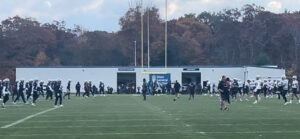
Sophia Sargent
NEFJ Correspondent
FOXBOROUGH – The New England Patriots have to make sure that players are on the same page moving forward both on the field and in the locker room.
After spending time on Wednesday at Gillette Stadium, it’s clear that even heading into Week 8 in the season, there’s no common ground on how players use social media to share thoughts, feelings, or moments in their careers.
With Jerod Mayo saying that the team played “soft” last weekend, it sparked various posts from players and continued conversation among both players and media about whether or not players actually consume what their coach is saying on socials.
“Look, we’re onto the Jets today,” Mayo said in his Wednesday press conference., “We’ve had those conversations. I’ve always looked at that as an opportunity to go out there and prove everyone wrong. Once again, going back to a chip on your shoulder, we’ve all had those chips on our shoulders at times that have gotten us through. So, this is no different. Obviously, once again, we are struggling as a team. Our record is what it is. It’s about what we can do to get better.”
Hunter Henry added “this comment has to challenge you, you know, you never want that to be your identity at all. So, I think that’s a big challenge for all of us. You know, I think I’ve looked at myself in the mirror and I think everyone will look at themselves.”
Even though Mayo claims that he uses the media to reach the players, that doesn’t seem to be a consensus amongst the team. After catching up with Jacoby Brissett, Brendan Schooler, and Kayshon Boutte, nobody had the same response to social media usage in the NFL.
Kayshon Boutte – who has heard and seen plenty of stuff about himself on social media after his arrest for gambling issues last year – had his own take on how guys use social media, something that was basically forbidden under Bill Belichick, but is now clearly not as frowned upon by the new regime.
“I think with the high profile that we are, we just have to approach it different,” Boutte said. “You gotta know that you can’t say things that everybody can say, even if you just tweet something randomly, it will get blown out of proportion…After you had a bad game, you know you kind of just want to stay away from the media, and not put anything out there because on the outside looking in, it looks like well you just had a bad game, why are you doing that?
“From my perspective you just have to leave it alone.”
“Whatever you’re frustrated with, whether it’s good, bad, or indifferent, I think it’s better for everything to just stay in the locker room and behind closed doors,” Schooler added. The veteran special teamer – like Brissett – has seen the evolution of social media in locker rooms throughout his career in the NFL.
“Once you go to social media I think there’s times where people can misinterpret what you’re saying…you never want to react out of emotion on a platform like Instagram, Twitter, X, or whatever…so me personally, I try to keep that all in the house that we’re building.”
“A lot of guys go the opposite way of what I do…and put a lot of their business out. I think that’s the cool thing to do nowadays,” said Brissett. “You know, you try to gain fans and all of the stuff, and I couldn’t care less about all of that stuff.”
It’s hard to say what players actually see and what they don’t. Having each player on the same page when it comes to social media usage as grown adults can be difficult, because some players are younger and more familiar with Instagram, Twitter, and Tiktok.
For a cohesive locker room – particularly one that’s not winning games – it may be helpful to chat about these perspectives and lay some ground rules going forward, otherwise chaos may continue to ensue.